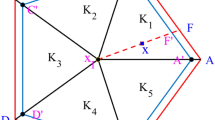Abstract
In this work, an adaptive element free Galerkin (EFG) technique is proposed for solving convection diffusion equation. A post-processed gradient is used as a posteriori error estimation to find locations with large contribution of the error. Also, to avoid instabilities, the EFG method is applied on a modified equation instead of the original equation. In the modified equation diffusion coefficient (known as artificial diffusion) depends to the distance between nodal points. The numerical results reveal efficiency of the adaptive technique.










Similar content being viewed by others
References
Ainsworth M, Oden JT (1993) A unified approach to a posteriori error estimation using element residual methods. Numer Math 65:23–50
Bank RE, Weiser A (1985) Some a posteriori error estimotors for elliptic partial differential equations. Math Comp 44:283–301
Belytschko T, Krongauz Y, Fleming M, Organ D, Liu W (1996) Smoothing and accelerated computations in the element free Galerkin method. J Comput Appl Math 74:111–126
Belytschko T, Lu Y, Gu L (1994) Element free Galerkin methods. Int J Num Meth Eng 37:229–256
Burman E, Hansbo P (2004) Edge stabilization for Galerkin approximations of convection-diffusion-reaction problems. Comput. Methods Appl. Mech. Engrg. 193:1437–1453
Dehghan M, Abbaszadeh M (2018) Variational multiscale element-free Galerkin method combined with the moving Kriging interpolation for solving some partial differential equations with discontinuous solutions. Comp Appl Math 37:3869–3905
Dehghan M, Abbaszadeh M (2018) A reduced proper orthogonal decomposition (POD) element free Galerkin (POD-EFG) method to simulate two dimensional solute transport problems and error estimate. Appl Numer Math 126:92–112
Dehghan M, Narimani N (2018) An element free Galerkin meshless method for simulating the behavior of cancer cell invasion of surrounding tissue. Appl Math Model 59:500–513
Dolbow J, Belytschko T (1999) Numerical integration of the Galerkin weak form in meshfree methods. Comput Mech 23:219–230
Dolbow J, Belytschko T (1998) An introduction to programming the meshless element free Galerkin method. Arch Comput Methods Eng 5:207–241
Eriksson K, Estep D, Hansbo P, Johnson C (1995) Introduction to adaptive methods for differential equations. Acta Numer 105–158
Gockenbach MS (2006) Understanding and implementing the finite element method. SIAM
Gratsch T, Bathe K (2005) A posteriori error estimotion techniques in practical finite element analysis. Comput Struct 83:235–265
Jannesari Z, Tatari M (2017) A meshfree technique for numerical simulation of reaction–diffusion systems in developmental biology. Adv Appl Math Mech 9:1225–1249
Jannesari Z, Tatari M (2016) Element-free Galerkin method to the interface problems with application in electrostatic. Int J Numer Model 1089–1105
John V (2000) A numerical study of a posteriori error estimators for convection–diffusion equations. Comput Methods Appl Mech Eng 190:757–781
Lancaster P, Salkauskas K (1981) Surface generated by moving least squares methods. Math Comput 37:141–158
Larson MG, Bengzon F (2013) The finite element method. Theory, implementation and applications. Springer
Lin H, Atluri SN (2000) Meshless local-Petrov Galerkin (MLPG) methods for convection–diffusion problems. CMES 1:45–60
Liu GR (2003) Mesh free methods-moving beyond the finite element method. CRC Press LLC, London
Quarteroni A, Saleri F, Gervasio P (2014) Scientific Computing with MATLAB and Octave, 4th edn. Springer-Verlag, Berlin Heidelberg
Tang T, Trummer MR (1996) Boundary layer resolving pseudospectral methods for singular perturbation problems. SIAM J Sci Comput 17:430–438
Yaw L (2009) Introduction to moving least squares (MLS) shape functions. Walla Walla University, College Place
Zienkiewicz OC, Zhu JZ (1992) The superconvergent path recovery and a posteriori error estimotion. Part \(1\): the recovery technique. Int J Numer Methods Eng 33:1365–1382
Acknowledgements
The authors are very grateful to reviewers for carefully reading the paper and for their constructive comments and suggestions. This research was in part supported by a grant from IPM (No. 95650422).
Author information
Authors and Affiliations
Corresponding author
Additional information
Communicated by Corina Giurgea.
Publisher's Note
Springer Nature remains neutral with regard to jurisdictional claims in published maps and institutional affiliations.
Rights and permissions
About this article
Cite this article
Jannesari, Z., Tatari, M. An adaptive strategy for solving convection dominated diffusion equation. Comp. Appl. Math. 39, 78 (2020). https://doi.org/10.1007/s40314-020-1081-4
Received:
Revised:
Accepted:
Published:
DOI: https://doi.org/10.1007/s40314-020-1081-4
Keywords
- Element free Galerkin (EFG) method
- Moving least squares (MLS) approximation
- Error estimation
- Adaptive technique
- Local refinement




